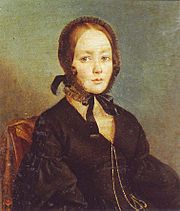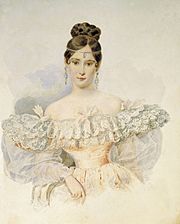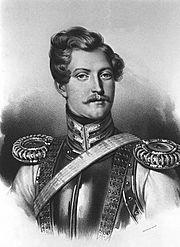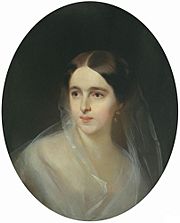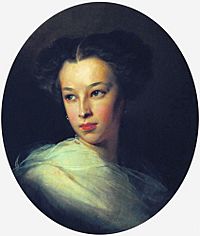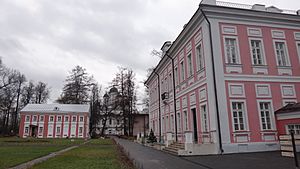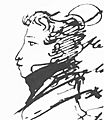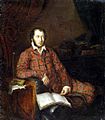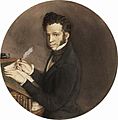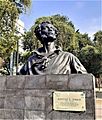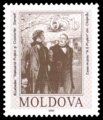Alexander Pushkin facts for kids
Quick facts for kids
Alexander Pushkin
|
|
|---|---|
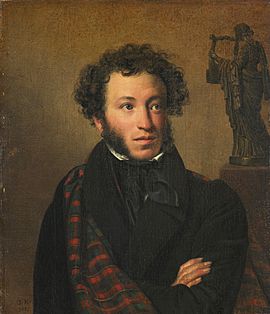
Portrait by Orest Kiprensky, 1827
|
|
| Native name |
Александр Сергеевич Пушкин
|
| Born | 6 June 1799 Moscow, Russian Empire |
| Died | 10 February 1837 (aged 37) Saint Petersburg, Russian Empire |
| Occupation | Poet, novelist, playwright |
| Language | Russian |
| Alma mater | Tsarskoye Selo Lyceum |
| Period | Golden Age of Russian Poetry |
| Genre | Novel, novel in verse, poem, drama, short story, fairytale |
| Literary movement | |
| Notable works | Eugene Onegin, The Captain's Daughter, Boris Godunov, Ruslan and Ludmila |
| Spouse |
Natalia Pushkina
(m. 1831) |
| Children | 4 |
| Signature | |
Alexander Sergeyevich Pushkin (English: /ˈpʊʃkɪn/; Russian: Александр Сергеевич Пушкин, tr. Aleksandr Sergeyevich Pushkin, IPA: [ɐlʲɪkˈsandr sʲɪrˈɡʲe(j)ɪvʲɪɕ ˈpuʂkʲɪn]; 6 June [O.S. 26 May] 1799 – 10 February [O.S. 29 January] 1837) was a famous Russian poet, writer, and playwright from the Romantic period. Many people believe he was the greatest Russian poet and the person who started modern Russian literature.
Pushkin was born into a noble family in Moscow. His great-grandfather on his mother's side, Abram Petrovich Gannibal, was a nobleman of African origin. He was taken from his home and raised in the Emperor's court.
Pushkin published his first poem when he was 15. By the time he finished school, he was already well-known in the literary world. After graduating, he recited a poem called "Ode to Liberty". This poem, and others, led to him being sent away by Emperor Alexander I.
Even though the Emperor's police watched him closely and he couldn't publish freely, Pushkin wrote his most famous play, Boris Godunov. His novel in verse, Eugene Onegin, was published in parts between 1825 and 1832. Pushkin was badly hurt in a duel and died two days later.
Contents
Early Life and School Days
Pushkin was born in Moscow. He was mostly taught by French tutors and spoke French until he was about ten. He learned Russian by talking with the people who worked in his household and his beloved nanny, Arina Rodionovna. He felt closer to her than to his own mother.
He wrote his first poem at 15. When he finished school at the special Imperial Lyceum near Saint Petersburg, his writing talent was already famous in Russia. At the Lyceum, he learned from David Mara, who was the younger brother of a French revolutionary named Jean-Paul Marat.
After school, Pushkin joined the lively and exciting youth culture in St. Petersburg, which was then the capital of Russia. In 1820, he published his first long poem, Ruslan and Ludmila. It caused some debate because of its topic and style.
Pushkin's Fight for Change
At the Lyceum, Pushkin was greatly influenced by the ideas of Alexander Petrovich Kunitsyn, who taught about freedom for individuals. Pushkin later honored Kunitsyn in his poem 19 October. Pushkin also studied the ideas of the French Enlightenment, especially Voltaire. He called Voltaire "the first to follow the new road" and bring new ideas into history.
Pushkin slowly became interested in social reform, which means making society better. He became a voice for writers who wanted change. This made the government angry, and he was moved away from the capital in May 1820. He traveled to the Caucasus and Crimea, and then to Kamianka and Chișinău. There, he joined a secret group called the Freemasons.
He also joined the Filiki Eteria, a secret group that wanted to end Ottoman rule in Greece and create an independent Greek state. He was inspired by the Greek Revolution and kept a diary about the events of the uprising.
Becoming a Famous Writer
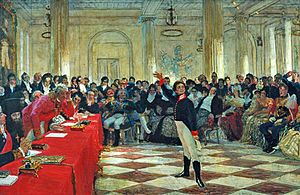
Pushkin stayed in Chișinău until 1823. During this time, he wrote two Romantic poems that made him very popular: The Captive of the Caucasus and The Fountain of Bakhchisaray. In 1823, Pushkin moved to Odessa. There, he again had problems with the government, which sent him to his mother's country estate, Mikhailovskoye, near Pskov, from 1824 to 1826.
In Mikhaylovskoye, Pushkin wrote love poems. He also worked on his famous novel in verse, Eugene Onegin.
In 1825, Pushkin wrote the poem To***. Many believe he wrote it for Anna Kern, but there are other ideas. Some think it was for a serf named Olga Kalashnikova, or even for Empress Elizaveta Alekseyevna.
Authorities called Pushkin to Moscow after his poem "Ode to Liberty" was found with the rebels of the Decembrist Uprising in 1825. After his exile in 1820, Pushkin's friends and family kept asking for his release. They wrote letters and met with Emperor Alexander I and then Emperor Nicholas I.
After meeting Emperor Nicholas I, Pushkin was released from exile. He started working as the Emperor's advisor for the National Archives. However, because rebels had kept some of his earlier political poems, the Emperor kept strict control over everything Pushkin published. Pushkin was also not allowed to travel freely.
In 1825, while at his mother's estate, Pushkin also wrote his most famous play, Boris Godunov. He couldn't get permission to publish it until five years later. The original version of the play was not performed until 2007.
Around 1825–1829, he met and became friends with the Polish poet Adam Mickiewicz. In 1829, Pushkin traveled through the Caucasus to Erzurum to visit friends fighting in the Russian army during the Russo-Turkish War. At the end of 1829, Pushkin wanted to travel abroad, which he wrote about in his poem Let's go, I'm ready. He asked for permission to travel but was told no by Nicholas I on January 17, 1830.
Around 1828, Pushkin met Natalia Goncharova. She was 16 and known as one of the most beautiful women in Moscow. After thinking about it for a long time, Natalia agreed to marry Pushkin in April 1830. But she first wanted to be sure that the government would not bother the poet. Later, Pushkin and his wife became regular guests at court events. They officially got engaged on May 6, 1830, and sent out wedding invitations. Because of a cholera outbreak, the wedding was delayed for a year. The ceremony took place on February 18, 1831, in Moscow.
When the Emperor gave Pushkin a low court title, "Gentleman of the Chamber," the poet became very angry. He felt the Emperor was trying to make him look bad, suggesting he was only allowed at court because of his wife, who had many admirers, including the Emperor himself. Pushkin's marriage to Natalia was mostly happy. However, his wife's playful nature and his own jealous personality led to his fatal duel seven years later.
In 1831, as Pushkin's writing became more influential, he met Nikolai Gogol, another great Russian writer. After reading Gogol's short stories, Evenings on a Farm Near Dikanka, Pushkin supported him. He even published some of Gogol's most famous stories in the magazine The Contemporary, which Pushkin started in 1836.
Pushkin's Final Years
By the autumn of 1836, Pushkin was deeply in debt. There were also rumors about his wife. On November 4, he challenged Georges d'Anthès to a duel. Jacob van Heeckeren, d'Anthès' adoptive father, asked for the duel to be delayed. With help from Pushkin's friends, the duel was canceled.
On November 17, d'Anthès proposed to Natalia Goncharova's sister, Ekaterina. Even after they married, the conflict didn't end. D'Anthès continued to pursue Natalia Goncharova in public. Rumors spread that d'Anthès had married Natalia's sister just to protect her reputation.
On January 26 (February 7 in the modern calendar) of 1837, Pushkin sent a very insulting letter to Gekkern. Pushkin knew that the only response to such a letter would be a challenge to a duel. He received the formal challenge from d'Anthès that same day.
Pushkin asked Arthur Magenis, who worked at the British Consulate-General in Saint Petersburg, to be his second (a person who helps arrange a duel). Magenis didn't officially agree. He tried to make peace, but d'Archiac, d'Anthès' second, refused to talk to him. Magenis then sent Pushkin a letter, saying he couldn't be his second because peace was no longer possible.
The pistol duel with d'Anthès happened on January 27 (February 8) at the Black River. Pushkin did not have a second present. They fought a "barrier duel." In this type of duel, the two people start at a set distance. When given the signal, they walk towards each other. They can shoot whenever they want. However, the person who shoots first must stand still and wait for the other person to shoot back.
D'Anthès shot first, seriously wounding Pushkin. The bullet hit his hip and went into his stomach. D'Anthès was only slightly wounded in his right arm by Pushkin's shot. Two days later, on January 29 (February 10) at 2:45 PM, Pushkin died from an infection.
At his wife's request, Pushkin was placed in his coffin in evening clothes, not in a military uniform. The funeral service was moved to a different church, and many people attended. After the service, his coffin was kept in a basement until February 3. Then, it was taken to Pskov province. Pushkin was buried at the Svyatogorsky monastery in Pushkinskiye Gory, near Pskov, next to his mother. His last home is now a museum.
Pushkin's Family Today
Pushkin had four children with Natalia: Maria (born 1832), Alexander (born 1833), Grigory (born 1835), and Natalia (born 1836). Natalia, his youngest daughter, married Prince Nikolaus Wilhelm of Nassau and was given the title of Countess of Merenberg. Her daughter Sophie married Grand Duke Michael Mikhailovich of Russia, who was a grandson of Emperor Nicholas I.
Only the family lines of Alexander and Natalia continue today. Natalia's granddaughter, Nadejda, married into the British royal family. Her husband was the uncle of Prince Philip, Duke of Edinburgh. She is also the grandmother of the current Marquess of Milford Haven. Pushkin's descendants now live all over the world, including in the United Kingdom, the Czech Republic, Germany, Belgium, Luxembourg, and the United States.
Pushkin's Lasting Impact
On Literature
Many of Pushkin's works are considered masterpieces. These include the poem The Bronze Horseman and the play The Stone Guest, which tells the story of Don Juan. His short play Mozart and Salieri inspired Peter Shaffer's play Amadeus and was used almost exactly as the story for Rimsky-Korsakov's opera Mozart and Salieri.
Pushkin is also known for his short stories, especially The Tales of the Late Ivan Petrovich Belkin, which includes "The Shot". Pushkin himself liked his novel in verse, Eugene Onegin, the most. He worked on it throughout his life. This work started a tradition of great Russian novels.
Eugene Onegin is so complex that it took translator Vladimir Nabokov two full books to explain its meaning in English. Because it's hard to translate, Pushkin's poems are not as well known to English readers. Still, Pushkin has greatly influenced Western writers like Henry James. Pushkin also wrote "The Queen of Spades", a short story that is often included in English collections.
On Music
Pushkin's works also gave many ideas to Russian composers. Glinka's Ruslan and Lyudmila was the first important opera inspired by Pushkin. It became a key work in Russian music. Tchaikovsky's operas Eugene Onegin (1879) and The Queen of Spades (1890) became perhaps more famous outside Russia than Pushkin's original works.
Mussorgsky's huge opera Boris Godunov (with two versions, 1868–9 and 1871–2) is considered one of the best and most original Russian operas.
Other Russian operas based on Pushkin's works include Dargomyzhsky's Rusalka and The Stone Guest. Also, Rimsky-Korsakov's Mozart and Salieri, Tale of Tsar Saltan, and The Golden Cockerel. Many other composers also used Pushkin's poems for ballets, cantatas, and countless songs.
On Russian Literature
Pushkin is often given credit for developing Russian literature. He is seen as the one who created the very detailed and rich language that is found in Russian literature after him. He also added many new words to the Russian language. When he found gaps in Russian vocabulary, he created new words. His rich vocabulary and sensitive writing style are the basis for modern Russian literature.
His achievements set new standards for the Russian language and culture. He became the "father" of Russian literature in the 19th century. He introduced Russia to all the European literary styles and many Western European writers. He brought natural speech and foreign influences to create modern poetic Russian. Even though he lived a short life, he left examples of almost every type of writing of his time: lyric poetry, long narrative poems, novels, short stories, plays, critical essays, and even personal letters.
His work as a critic and journalist marked the beginning of Russian magazine culture. He helped create and wrote a lot for one of the most important literary magazines of the 19th century, Sovremennik (The Contemporary). Pushkin inspired the folk tales and other works of authors like Leskov, Yesenin, and Gorky. His use of Russian formed the basis for the style of novelists like Ivan Turgenev, Ivan Goncharov, and Leo Tolstoy, as well as later poets like Mikhail Lermontov.
Honors and Legacy
- Soon after Pushkin died, the Russian poet Mikhail Lermontov wrote "Death of the Poet". This poem blamed the rich noble class for Pushkin's death. It was not published but was passed around secretly in St. Petersburg. Lermontov was arrested and sent away.
- In 1929, Soviet writer Leonid Grossman published a novel, The d'Archiac Papers, which told the story of Pushkin's death from the view of a French diplomat who saw the duel.
- In 1937, the town of Tsarskoye Selo was renamed Pushkin in his honor.
- There are several museums in Russia dedicated to Pushkin, including two in Moscow, one in Saint Petersburg, and a large complex in Mikhaylovskoye.
- Pushkin's death was shown in the 2006 movie Pushkin: The Last Duel.
- The Pushkin Trust was started in 1987 to celebrate his creative spirit and help children in Ireland express their thoughts and feelings.
- A small planet, 2208 Pushkin, discovered in 1977, is named after him. A crater on Mercury is also named in his honor.
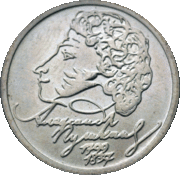
- The ship MS Aleksandr Pushkin was named after him.
- A metro station in Tashkent was named in his honor.
- The Pushkin Hills and Pushkin Lake in Ontario, Canada, were named after him.
- UN Russian Language Day, celebrated every year on June 6, was chosen to be on Pushkin's birthday.
- A statue of Pushkin was put up in Manila, Philippines, in 2010 to celebrate the friendship between the Philippines and Russia.
- The Alexander Pushkin diamond, the second largest found in Russia, was named after him.
- In 2005, a monument to Pushkin and his grandmother was made in Zakharovo, Russia.
- In 2019, Moscow's Sheremetyevo International Airport was named after Pushkin.
Works
Long Poems
- 1820 – Ruslan i Ludmila (Ruslan and Ludmila)
- 1820–21 – Kavkazskiy plennik (The Prisoner of the Caucasus)
- 1821 – Gavriiliada (The Gabrieliad)
- 1821–22 – Bratia razboyniki (The Robber Brothers)
- 1823 – Bakhchisarayskiy fontan (The Fountain of Bakhchisaray)
- 1824 – Tsygany (The Gypsies)
- 1825 – Graf Nulin (Count Nulin)
- 1829 – Poltava
- 1830 – Domik v Kolomne (The Little House in Kolomna)
- 1833 – Andzhelo (Angelo)
- 1833 – Medny vsadnik (The Bronze Horseman)
- 1825–1832 (1833) – Evgeniy Onegin (Eugene Onegin)
Plays
- 1825 – Boris Godunov (Boris Godunov)
- 1830 – Malenkie tragedii (Little Tragedies)
- Kamenny gost (The Stone Guest)
- Motsart i Salieri (Mozart and Salieri)
- Skupoy rytsar (The Miserly Knight, or The Covetous Knight)
- Pir vo vremya chumy (A Feast in Time of Plague)
Prose Works
Short Stories
- 1831 – Povesti pokoynogo Ivana Petrovicha Belkina (The Tales of the Late Ivan Petrovich Belkin)
- Vystrel (The Shot)
- Metel (The Blizzard)
- Grobovschik (The Undertaker)
- Stantsionny smotritel (The Stationmaster)
- Baryshnya-krestianka (The Squire's Daughter)
- 1834 – Pikovaya dama (The Queen of Spades)
- 1834 – Kirjali (Kirdzhali)
- 1837 – Istoria sela Goryuhina (The Story of the Village of Goryukhino), unfinished
- 1837 – Egypetskie nochi (The Egyptian Nights)
Novels
- 1828 – Arap Petra Velikogo (The Moor of Peter the Great), unfinished
- 1829 – Roman v pis'makh (A Novel in Letters), unfinished
- 1836 – Kapitanskaya dochka (The Captain's Daughter)
- 1836 – Roslavlyov (Roslavlev), unfinished
- 1841 – Dubrovsky (Dubrovsky), unfinished novel
Non-fiction
- 1834 – Istoria Pugachyova (A History of Pugachev), a study of the Pugachev's Rebellion
- 1836 – Puteshestvie v Arzrum (A Journey to Arzrum), travel writings
Fairy Tales in Verse
- 1822 – Царь Никита и сорок его дочерей (Tsar Nikita and His Forty Daughters)
- 1825 – Жених (The Bridegroom)
- 1830 – Сказка о попе и о работнике его Балде (The Tale of the Priest and of His Workman Balda)
- 1830 – Сказка о медведихе (The Tale of the Female Bear, or The Tale of the Bear), unfinished
- 1831 – Сказка о царе Салтане (The Tale of Tsar Saltan)
- 1833 – Сказка о рыбаке и рыбке (The Tale of the Fisherman and the Fish)
- 1833 – Сказка о мертвой царевне (The Tale of the Dead Princess)
- 1834 – Сказка о золотом петушке (The Tale of the Golden Cockerel)
See also
 In Spanish: Aleksandr Pushkin para niños
In Spanish: Aleksandr Pushkin para niños
- Anton Delvig
- Aleksandra Ishimova
- Anna Petrovna Kern
- Fyodor Petrovich Tolstoy
- Literaturnaya Gazeta
- Pushkin Prize
- Vasily Pushkin
- Vladimir Dal
- Kapiton Zelentsov, contemporary illustrator of Pushkin's novels
- UN Russian Language Day
Images for kids
-
Pushkin's Farewell to the Sea by Ivan Aivazovsky and Ilya Repin, 1877
-
1899 portrait of Pushkin by Konstantin Somov
-
2010 Pushkin automaton, by Swiss automaton maker François Junod.
-
1999 stamp of Moldova showing Pushkin and Constantin Stamati
-
Bust of Pushkin in Odessa, Ukraine, 2016


